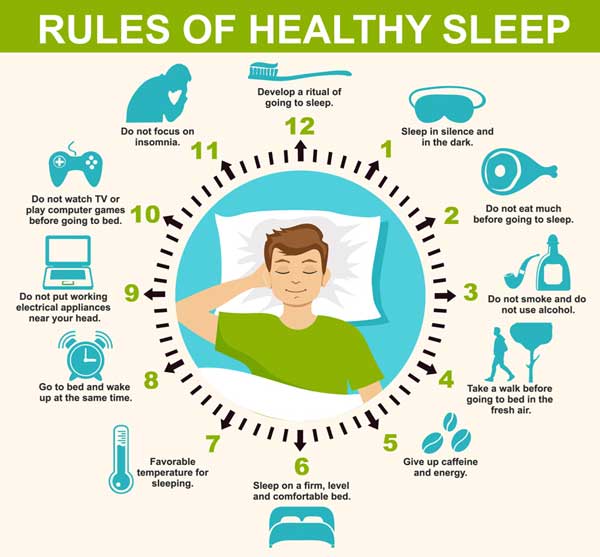What if the key to maintaining healthy weight and strong mental health were no further away than your pillow? From disruptions in our daily routines to added stress from the uncertainty during the coronaviruscoronavirus co·ro·na·vi·rus : any of a family (Coronaviridae) of single-stranded RNA viruses that have a lipid envelope studded with club-shaped projections, infect birds and many mammals including humans, and include the causative agents of MERS, SARS, and COVID-19 pandemicpandemic (pan·dem·ic) : an outbreak of a disease that occurs over a wide geographic area and affects an exceptionally high proportion of the population : a pandemic outbreak of a disease., many of us are having a hard time getting a good night’s sleep.
Good sleep helps maintain a variety of bodily functions. Adequate sleep helps regulate your metabolism, enhance recuperation, burn fat and promote brain health. It’s also a key ingredient in our emotional wellness and mental health, helping to decrease fatigue and beat back stress and anxiety. Visit the National Sleep Foundation for information on Sleep Guidelines During Coronavirus Isolation.
Sleep deprivation and sleep deficiency is a public health concern. Chronic sleep loss can contribute to health problems such as weight gain, high blood pressure, and a decrease in your immune system’s strength. Obesity, diabetes and high cholesterolcholesterol cho·les·ter·ol | \ kə-ˈle-stə-ˌrōl Cholesterol is a waxy, fat-like substance that's found in all the cells in your body. Your body needs some cholesterol to make hormones, vitamin D, and substances that help you digest foods. Your body makes all the cholesterol it needs. Cholesterol is also found in foods from animal sources, such as egg yolks, meat, and cheese. are more prevalent among irregular sleepers. Read our article “Sleep Plays Crucial Role in Mental, Physical Health” for details and tips for achieving quality sleep.
How do we fall asleep & what keeps us asleep?
You feel sleepy because of a buildup of a chemical called adenosine in the brain, which happens throughout the day as you head toward night. Another signal the brain sends your body to say it’s time for sleep is vasolidatation, which is the dilation of the blood vessels. Other signals include an increase in melatonin production due to darkness and a lowering of the core body temperature.
It takes a healthy sleeper about 15 minutes to fall asleep. If you’re tossing and turning much longer than that, you should get out of bed, change the environment and do something else.
Tip: Warm Feet, Deep Sleep – Covering your feet helps regulate your body temperature. Wearing loose-fitting socks to bed can help trigger vasolidatation, the sleep trigger, and help create longer, more quality sleep.
The Metabolic Role of Sleep
During the night, your body goes to work repairing any damage done on a cellular level during your waking hours.

Deep sleep, or non-REM (rapid eye movement) sleep, is the time when the body repairs itself and builds up energy for the day ahead. Sleep stimulates autophagy, a natural process for clearing dysfunctional and unwanted molecules from the trillions of cells in the body.
REM (rapid eye movement) sleep, when most of your dreaming occurs, is thought to play a role in learning, memory, and mood. REM sleep maintains the housekeeping functions of the brain. Most people enter REM sleep 90 minutes after falling asleep, and REM sleep occurs several times nightly, accounting for 20-25% of an adult’s sleep cycle.
-
Sleep plays a role in maintaining healthy hormone levels
Sleep deprivation affects the way our bodies process carbohydrates and alters levels of hormones that affect our appetite.
Sleep deficiency lowers testosterone, a hormone that promotes growth of lean muscle mass. Sleep helps your body regulate adrenaline and other stress-related hormones, like cortisol, which trigger our “fight-or-flight” response.
-
Adequate Sleep Helps Dieters Burn Fat
Despite the fact you are resting, your body consumes energy while you are asleep. Particularly during REM sleep, when your brain is most active, you burn the most glucose, your body’s source of fuel.
Even while you are sleeping, you are burning calories. In a University of Chicago study on sleep and weight loss published by the Annals of Internal Medicine, cutting back on sleep while trying to lose weight reduced fat loss by 55%. Dieters who got adequate sleep maintained more muscle and lost more fat than dieters who did not. For those with proper rest more than half of the weight they lost was fat. When they cut back on their sleep, only one-fourth of their weight loss came from fat.
For details on how exercise impacts your immune systemimmune system : the bodily system that protects the body from foreign substances, cells, and tissues by producing the immune response and that includes especially the thymus, spleen, lymph nodes, special deposits of lymphoid tissue (as in the gastrointestinal tract and bone marrow), macrophages, lymphocytes including the B cells and T cells, and antibodies., see our blog “Exercise Revs up Your Immune System, Increases Resiliency.”
-
Your Brain Scrubs Away Waste While You Sleep
Your body takes advantage of the decreased brain activity during sleep to flush out toxic proteins that may otherwise form buildups that can impair the flow of information between neurons. While you are asleep your brain cells shrink, allowing cerebrospinal fluid to flow easily to flush the brain of neural waste linked to the accumulation of toxins in the brain. In fact, the brain’s synapses — the connections among neurons—shrink back by nearly 20%. A recently-discovered system, called the glymphatic system, prunes back temporary synapses encoded throughout the day to allow you to retain the most important information. The synchronized brain waves of non-REM sleep may play a key role in preventing toxins from accumulating in the space between brain cells, believed to be the cause of many neurodegenerative disorders.
-
Sleep Apnea Lowers Blood Oxygen, Increases Risk of Stroke, Cancer
If you or your loved one snores in your sleep, you should consider getting a sleep study to determine if you have sleep apnea. Obstructive sleep apnea decreases blood flow to the brain, decreases blood oxygen level, and elevates blood pressure within the brain. With sleep apnea, the body actually stops breathing as frequently as 20 to 30 times per hour. It’s estimated that 50-70% of stroke victims have sleep apnea.
A 20-year followup study found people with moderate to severe obstructive sleep apnea were 4 times more likely to die, nearly 4 times (3.7x) more likely to have a stroke, and 3.4 times more likely to die from cancer, according to the American Academy of Sleep Medicine.
-
Sleeping on Your Side Helps the Lymphatic System Clear Waste
You spend approximately one-third of your life asleep. How you sleep can impact pressure on your organs and the effectiveness of your body’s waste-removal process during sleep.
Only about 8% of people sleep on their backs. Sleeping on your side can reduce joint and back pain. If you sleep on your side, a firm pillow between your knees will prevent your upper leg from pulling your spine out of alignment and reduce stress on your hips and lower back. Studies have shown that sleeping on your left side is best, possibly because it reduces pressure on your internal organs, boosts digestion and stimulates the drainage of toxins from your lymph nodes to your spleen. Sleeping on the left side may also reduce sleep apnea and GERD, or acid reflux, even more than sleeping on the right. Sleeping on the left side during pregnancy is recommended to maximize the flow of blood and nutrients to the baby.
For information on Good Medicine Choice Immushield Essential Oil Blend, please visit our shop and order online. (Shipping is free.)


No comments yet. Be the first one to leave a thought.